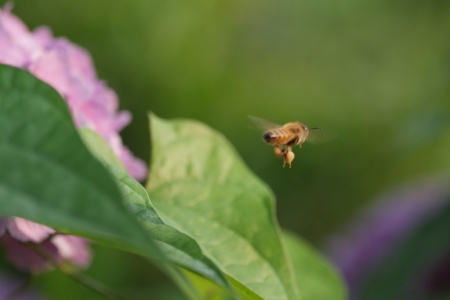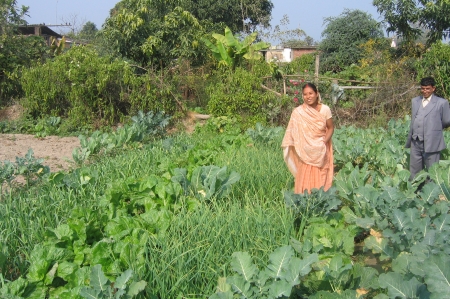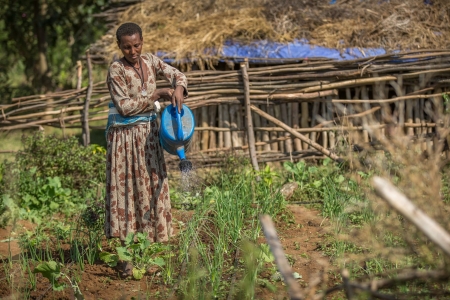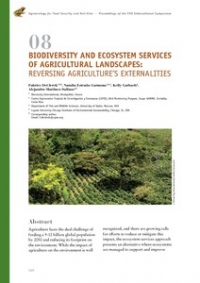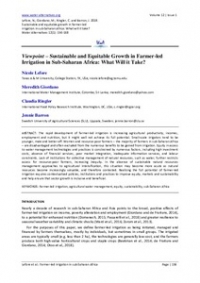Originally published on the International Food Policy Research Institute blog.
As people and organizations around the globe mark World Environment Day (June 5), all signs point to an unprecedented and rapid decline in planetary health. A preview of a global report on biodiversity, the most comprehensive to ever be completed, somberly notes that 1 million animal and plant species are on the brink of extinction, many within mere decades. Since 1980, greenhouse gas emissions have doubled and human-induced warming reached approximately 1 degree Celsius above pre-industrial levels, and is growing at around 0.2 degree Celsius per decade. The impacts of climate change on this scale are only starting to be fully understood.
Human health depends intimately on planetary health. The loss of ecosystem services erodes the social and economic support systems of people around the world, especially the poorest and most vulnerable. Higher temperatures and extreme weather events such as droughts, floods, and hurricanes destroy agricultural systems, impoverishing the communities that depend on them for their livelihoods and food and nutrition security for years, decades and can even have inter-generational effects.
But the links go the other way too: Human activity is the leading driver of species loss and ecosystem damage. Loss of tropical forests, largely through clearing for agriculture, reached 15.8 million hectares in a single year alone (2017). Agricultural production has directly caused the degradation of one third of the world’s lands in the form of soil erosion, salinization, and chemical pollution. Excessive use of fertilizers has polluted fresh water sources, and over-extraction of groundwater has led to plummeting water tables.
Agriculture has also been a huge contributor of air pollution, the theme of this year’s World Environment Day, through ammonia gas from livestock manure, the burning of crop residues, and machinery operations. In poor areas, dependence on burning wood, charcoal, crop residues, and dung for energy contributes to deforestation and also leads to dangerous levels of household air pollution. In New Delhi, for example, the pollutants from the burning of wood and rural crop residues combined with vehicle emissions have been estimated to reduce residents’ life expectancy by six years.
Air pollution also affects rural dwellers. IFPRI and partners found that eliminating agricultural crop-residue burning in northern India would avert the loss of 14.9 million disability-adjusted life years per year, valued at more than $100 billion over 5 years. Air pollution is also a scourge in African countries where clean energy options are largely absent in rural areas, including Ethiopia, where IFPRI work has shown that adoption of improved cookstoves can also greatly reduce the country's carbon emissions—if such stoves could meet end user needs.
Thankfully, many tools are available to begin addressing these massive challenges. Some of these approaches are designed to offer economic incentives for safeguarding the environment or—in many cases—disincentives to harming it. For instance, payments for ecosystem services are common arrangements in which landowners are compensated for implementing specific land management practices on their property, such as allowing some of it to lie fallow, or making efforts to conserve water and biodiversity. Costa Rica’s implementation of such a program since the 1990s has helped it to reverse deforestation and reduce carbon emissions.
Another economic tool is eliminating subsidies for electricity, fossil fuels, chemical fertilizers, and irrigation water, which in their present state encourage overuse of these scarce resources. Subsidies can be replaced with direct income support to farmers, along with appropriately pricing these resources to ensure they are used sustainability.
Tradable rights for environmental “goods” (such as water) and environmental “bads” (such as greenhouse gas emissions) can also encourage more responsible resource use. For example, Australia has implemented a system of tradable water rights in its Murray-Darling Basin: Irrigators buy and sell water rights from a government body, which stands in as proxy for the environment. The system has been responsive during droughts and to other changes in water availability.
This kind of economic thinking is crucial, but not enough. Truly mitigating and reversing the decline of planetary health will require an overhaul of the global food system that has brought us to this point. Such a shift includes rethinking how food is actually produced, from breeding crops that can withstand heat and drought to promoting small-scale irrigation, which can double crop yields (as has already been accomplished in parts of Africa south of the Sahara) and save fragile lands from farming. It also involves reimagining how food is transported, stored, and consumed (or not consumed, in the form of food waste).
Another key piece in the planetary-human health puzzle are institutions. These can include actual organizations such as a local water-user association, a polluting company, or a government agency charged with environmental regulation. But institutions are also more broadly understood as legal frameworks, practices, and customs. Institutions that can improve environmental health include laws that recognize the rights of men and women—especially those from the poorest communities—to land, water, forests, and fisheries, to recognize their roles as custodians of the resources and reinforce their incentives for investment. For example, in Rwanda and Ethiopia, registering land in women’s names increased those women’s investments in soil conservation and tree planting.
This World Environment Day, let’s recognize that our fate as a species depends on food, fiber, and fuel that only a thriving, diverse, and clean environment can provide. When we safeguard environmental resources and protect biodiversity, we not only invest in the planet’s future, but also our own.
Claudia Ringler is Deputy Director of IFPRI's Environment and Production Technology Division (EPTD) and co-leader of the CGIAR Research Program on Water, Land and Ecosystems (WLE) Flagship Program on Variability, Risks and Competing Uses; Ruth Meinzen-Dick is an EPTD Senior Research Fellow.




